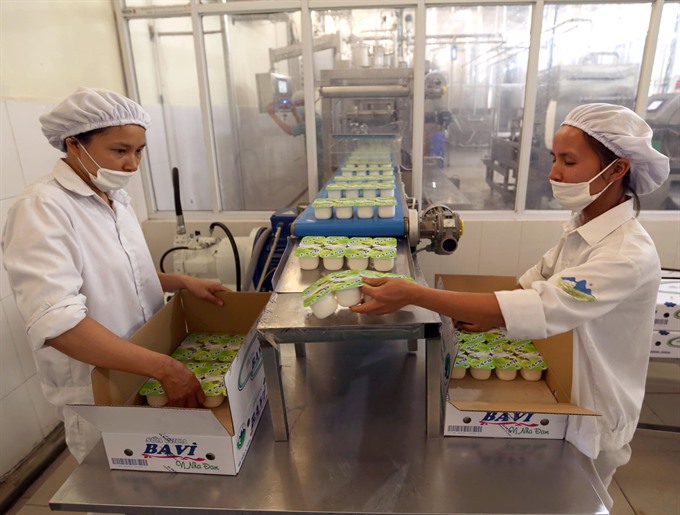 Society
Society

Business complains of excessive red tape on food safety
 |
| Wokers at Hà Nội-based Ba Vì Milk Joint Stocks Company pack dairy products.Excessive and overlapping regulations regarding food hygiene and safety management are said to burden food business. — VNA/VNS Photo Vũ Sinh |
HÀ NỘI — Businesses are complaining of excessive and overlapping regulations regarding food hygiene and safety management that not only burden them but have proven ineffective.
Reports by the Standing Committee of the National Assembly (NA) on the implementation of food safety laws and policies in the 2011-16 period said a swath of policies have been issued but have not been “systemised,” resulting in subpar performance.
For example, the production and trading of milk is subject to no less than 25 different regulations in six laws, six decrees and 13 guiding circulars, involving five State agencies, in addition to market surveillance and environmental protection that are under State management.
Phạm Trọng Nhân, NA deputy from the southern province of Bình Dương, demonstrated the complexity with the example of noodles. Their main ingredient – rice powder – is under the management of the Ministry of Agriculture and Rural Development (MARD), while starch is under the management of the Ministry of Industry and Trade (MoIT); if the noodles contain harmful substances like tinopal (used to make rice powder products look whiter) then the Ministry of Health (MoH) gets involved. In the case of mooncakes, the labels and packaging fall under the jurisdiction of the MoIT, the eggs and fillings are governed by the MARD, while additives are MoH’s concerns.
Businesses have been riling against a requirement of “a dossier of declaration of conformity to food safety regulations” (for products that don’t have technical regulations and standards) as stated in the Government’s Decree 38 (dated April 25, 2012) that is perceived to violate the Law on Food Safety 2010 as well as the Law on Promulgation of Legal Documents 2015.
Specifically, Article 12 of the Law on Food Safety 2010 says “prepackaged processed food must have a declaration of conformity with technical regulations, registered with competent State agencies prior to selling.” It does not mention an obligatory “dossier for declaration of compliance of food safety regulations,” as stated in Decree 38, says Đậu Anh Tuấn, director of the Legal Department of the Việt Nam Chamber of Commerce and Industry (VCCI).
Tuấn added that the Law on Standards and Technical Regulations also doesn’t provide for this measure. In addition, the Law on Promulgation of Legal Documents says “the elaborating document may only prescribe the contents assigned”, meaning, Decree 38 – which is an “elaborating document” – makes up a new requirement that does not exist in the Law it is supposed to elaborate.
According to Tuấn, the declaration on compliance with food safety regulations should be left to businesses and the State should focus on establishing a comprehensive and detailed set of standards and pay more attention to post-inspections instead.
VCCI and representatives from different associations, from tea and cocoa to seafood business sectors, have all called for the abolishment of this unreasonable requirement, suggesting that businesses can just send their sample products to appointed laboratories, and products deemed satisfactory can then be published on the laboratories’ websites, giving them a green light.
Nguyễn Đình Cung, director of the Central Institute for Economic Management, was quoted by Thời Báo Kinh Doanh (Economic Times) saying that the declaration on compliance takes 3-6 months while it should only take 1.5 month as provided in Decree 38.
“Receiving business complaints, the Prime Minister has instructed authorities to review and streamline procedures. However, the latest revision of the decree retains the two separate regulations, to the disappointment of businesses,” Cung said.
Relief needed
Dr Cung recognises that food safety is a matter of pressing concern that requires enhanced State management, however, “effectiveness can only come from a bold revamp and adoption of a new approach to management.”
Nguyễn Như So, NA deputy from Bắc Ninh Province, said the situation remains that “there are many laws but understanding of those laws is limited,” and called for “cutting back of overlapping, sometimes downright contradictory, laws that befuddle both State management and subjects under State management.”
The Food Administration, under MoH, however, defended the controversial regulation.
Trần Văn Châu, director of the Food Administration’s Legal Department, said food safety management must be conducted based on technical regulations issued by competent State agencies, not just standards established by businesses, especially with food that can directly affect consumers’ health.
Châu also disagreed that compliance declaration dossiers are against the law, reinforcing the large gaps between the perception of authorities and businesses.
"Only when the MARD can deliver a correct strategy for the country’s agriculture sector, and MoIT can wholly control the trading of chemicals, then the dismal food safety situation can start to finally improve," said Phạm Khánh Phong Lan, a deputy from HCM City. — VNS




